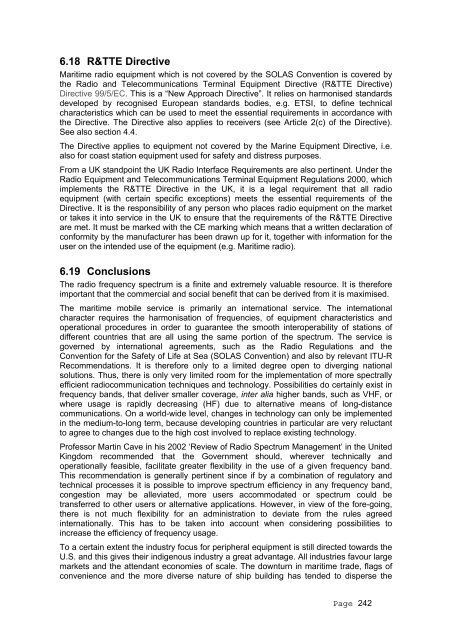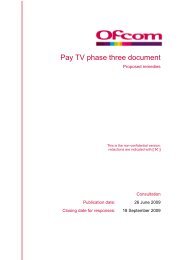FINAL REPORT - Stakeholders - Ofcom
FINAL REPORT - Stakeholders - Ofcom
FINAL REPORT - Stakeholders - Ofcom
You also want an ePaper? Increase the reach of your titles
YUMPU automatically turns print PDFs into web optimized ePapers that Google loves.
6.18 R&TTE Directive<br />
Maritime radio equipment which is not covered by the SOLAS Convention is covered by<br />
the Radio and Telecommunications Terminal Equipment Directive (R&TTE Directive)<br />
Directive 99/5/EC. This is a “New Approach Directive”. It relies on harmonised standards<br />
developed by recognised European standards bodies, e.g. ETSI, to define technical<br />
characteristics which can be used to meet the essential requirements in accordance with<br />
the Directive. The Directive also applies to receivers (see Article 2(c) of the Directive).<br />
See also section 4.4.<br />
The Directive applies to equipment not covered by the Marine Equipment Directive, i.e.<br />
also for coast station equipment used for safety and distress purposes.<br />
From a UK standpoint the UK Radio Interface Requirements are also pertinent. Under the<br />
Radio Equipment and Telecommunications Terminal Equipment Regulations 2000, which<br />
implements the R&TTE Directive in the UK, it is a legal requirement that all radio<br />
equipment (with certain specific exceptions) meets the essential requirements of the<br />
Directive. It is the responsibility of any person who places radio equipment on the market<br />
or takes it into service in the UK to ensure that the requirements of the R&TTE Directive<br />
are met. It must be marked with the CE marking which means that a written declaration of<br />
conformity by the manufacturer has been drawn up for it, together with information for the<br />
user on the intended use of the equipment (e.g. Maritime radio).<br />
6.19 Conclusions<br />
The radio frequency spectrum is a finite and extremely valuable resource. It is therefore<br />
important that the commercial and social benefit that can be derived from it is maximised.<br />
The maritime mobile service is primarily an international service. The international<br />
character requires the harmonisation of frequencies, of equipment characteristics and<br />
operational procedures in order to guarantee the smooth interoperability of stations of<br />
different countries that are all using the same portion of the spectrum. The service is<br />
governed by international agreements, such as the Radio Regulations and the<br />
Convention for the Safety of Life at Sea (SOLAS Convention) and also by relevant ITU-R<br />
Recommendations. It is therefore only to a limited degree open to diverging national<br />
solutions. Thus, there is only very limited room for the implementation of more spectrally<br />
efficient radiocommunication techniques and technology. Possibilities do certainly exist in<br />
frequency bands, that deliver smaller coverage, inter alia higher bands, such as VHF, or<br />
where usage is rapidly decreasing (HF) due to alternative means of long-distance<br />
communications. On a world-wide level, changes in technology can only be implemented<br />
in the medium-to-long term, because developing countries in particular are very reluctant<br />
to agree to changes due to the high cost involved to replace existing technology.<br />
Professor Martin Cave in his 2002 ‘Review of Radio Spectrum Management’ in the United<br />
Kingdom recommended that the Government should, wherever technically and<br />
operationally feasible, facilitate greater flexibility in the use of a given frequency band.<br />
This recommendation is generally pertinent since if by a combination of regulatory and<br />
technical processes it is possible to improve spectrum efficiency in any frequency band,<br />
congestion may be alleviated, more users accommodated or spectrum could be<br />
transferred to other users or alternative applications. However, in view of the fore-going,<br />
there is not much flexibility for an administration to deviate from the rules agreed<br />
internationally. This has to be taken into account when considering possibilities to<br />
increase the efficiency of frequency usage.<br />
To a certain extent the industry focus for peripheral equipment is still directed towards the<br />
U.S. and this gives their indigenous industry a great advantage. All industries favour large<br />
markets and the attendant economies of scale. The downturn in maritime trade, flags of<br />
convenience and the more diverse nature of ship building has tended to disperse the<br />
Page 242
















